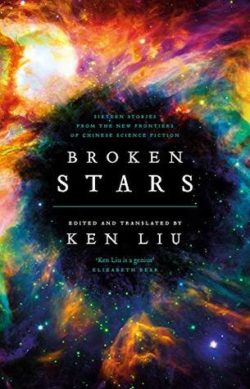October 2019: Xia Jia 夏笳
 Xia Jia (aka Wang Yao) is Associate Professor of Chinese Literature at Xi’an Jiaotong University and has been publishing speculative fiction since college. She is a seven-time winner of the Galaxy Award, China's most prestigious science fiction award and has published three science fiction collections (in Chinese): The Demon-Enslaving Flask (2012), A Time Beyond Your Reach (2017), and Xi’an City Is Falling Down (2018). She's also engaged in other science fiction related works, including academic research, translation, screenwriting, and teaching creative writing.
Xia Jia (aka Wang Yao) is Associate Professor of Chinese Literature at Xi’an Jiaotong University and has been publishing speculative fiction since college. She is a seven-time winner of the Galaxy Award, China's most prestigious science fiction award and has published three science fiction collections (in Chinese): The Demon-Enslaving Flask (2012), A Time Beyond Your Reach (2017), and Xi’an City Is Falling Down (2018). She's also engaged in other science fiction related works, including academic research, translation, screenwriting, and teaching creative writing.
Bio from A Summer Beyond Your Reach: Stories by Xia Jia
We're delighted to feature Xia Jia as our author of the month this October, to mark the start of our special genre fiction focus this year. She also appeared at our symposium this month, alongside fellow author Chen Qiufan (whose work will be featured on our Book Club in November).
 Our story this month is 'Goodnight, Melancholy', translated by Ken Liu, and first published in Clarkesworld magazine, in partnership with Storycom (where you can also hear an audio version of the story). It has also been reprinted in the anthology Broken Stars (edited and translated by Ken Liu),published in the UK by Head of Zeus.
Our story this month is 'Goodnight, Melancholy', translated by Ken Liu, and first published in Clarkesworld magazine, in partnership with Storycom (where you can also hear an audio version of the story). It has also been reprinted in the anthology Broken Stars (edited and translated by Ken Liu),published in the UK by Head of Zeus.
 A successful Kickstarter campaign by Neil Clarke, editor of Clarkesworld, is leading to the publication of a collection of Xia Jia's stories in English translation. This will be Xia Jia's debut collection in English, as well as the first of Clarkesworld's new imprint.
A successful Kickstarter campaign by Neil Clarke, editor of Clarkesworld, is leading to the publication of a collection of Xia Jia's stories in English translation. This will be Xia Jia's debut collection in English, as well as the first of Clarkesworld's new imprint.
A number of Xia Jia's stories can also be found online from the magazine, including 'A Hundred Ghosts Parade Tonight', 'Spring Festival: Happiness, Anger, Love, Sorrow, Joy', and Tongtong’s Summer.
Her work has been called 'porridge SF' (稀饭科幻), something she discusses in this 2015 interview with Ken Liu:
'I didn’t invent the term “porridge SF.” Many years ago, after I showed my best friend Yang Qing a short story I wrote in high school composition class, she said, “If we consider Ted Chiang’s ‘Tower of Babylon’ as a masterpiece of soft SF, then I must congratulate you on having created this beautiful piece of ‘porridge SF’!”
Chinese people describe steamed rice as “hard rice” or “soft rice” based on the water content, and porridge is obviously softer even than “soft rice.” Porridge SF thus describes a story mixed with so many non-science elements (e.g. myth, legend or folklore) that it can hardly be classified as “science fiction” anymore, like “Tower of Babylon.”
Since both Yang and I were big Ted Chiang fans, the phrase was intended as a compliment.
After the controversy around whether “The Demon-Enslaving Flask” was really “science fiction,” in 2005 I published my second story “Carmen,” a space opera mixed with a gothic legend of the mysterious dancing girl Carmen. In a postscript, I declared that “no matter how many may refuse to acknowledge the ‘SFnal cloak’ around this story, I will continue to devote myself to this seemingly promising career in ‘porridge SF.’” “Porridge SF” thus became the phrase to describe my style, which is usually regarded as the opposite of hard SF or so-called “core SF,” as exemplified by Liu Cixin’s works.
